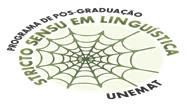Banca de DEFESA: MARCINETE ROCHA DA SILVA
Uma banca de DEFESA de DOUTORADO foi cadastrada pelo programa.DISCENTE : MARCINETE ROCHA DA SILVA
DATA : 25/03/2024
HORA: 08:30
LOCAL: plataforma meet
TÍTULO:
PROCESS OF MEANING MAKING IN PORTUGUESE LANGUAGE CLASSES FROM A TRANSLINGUAGING, MULTISENSORY AND AFFECTIVE PERSPECTIVE
PALAVRAS-CHAVES:
Meaning making, Portuguese Language, High School, Translingual, Affective and Multisensory Literacies
PÁGINAS: 170
GRANDE ÁREA: Lingüística, Letras e Artes
ÁREA: Lingüística
SUBÁREA: Lingüística Aplicada
RESUMO:
This thesis, linked to the Stricto Sensu Postgraduate Program in Linguistics – PPGL at the State University of Mato Grosso – UNEMAT, is related to the concentration area “Study of Linguistic Processes” and in the research line “Study of Social Practice Processes of Language”, from the perspective of Applied Linguistics. As the objective of this research, I seek to analyze how the meanings of text, language and affect were constructed in Portuguese language classes, with high school students, in post-structuralist perspectives of language that are guided by affectivity, assemblage and multisensoriality. To this end, as a theoretical framework, I was based on sensory literacy (Mills, 2013; 2016), translanguaging (Canagarajah, 2017; Pennycook, 2017), affect and critical affective literacy (Spinoza, 2009; Anwaruddin, 2016; Morgan, Rocha and Maciel, 2021; Ahmed, Morgan and Maciel 2021). The methodological bias, by which I was guided, consists of the critical ethnographic qualitative approach, from the perspective of the epistemology of postmodern emergence. I adopted this methodological bias, as it is a more dynamic form of data analysis, considering three dimensions for emergency quality: the processes of wondering, becoming and generating. In this context, emergence opens space for fluidity, becoming, the unexpected, in the search for new knowledge. Within this horizon, the data were generated in classes taught by me (researcher), with the presence, also, of the class teacher. For analysis, I considered recordings of classroom interactions, as well as photos and videos of extra-class activities recorded by students and myself. As a result, I realized that, unlike the cognitive and rationalist domain, the inclusion of embodiment (affect, multisensoriality) as an assemblage opened horizons for students to construct new meanings when communicating socially, using text and language as part of their experiential repertoires. I also realized that by placing themselves in a relationship of emotional equivalence with people, in a vulnerable position, students were affected, in order to transform their words and other sensory resources into actions in the school environment and in the community.
MEMBROS DA BANCA:
Interno - 132024003 - ANA CAROLINA DE LAURENTIIS BRANDAO
Interno - 132146001 - BARBARA CRISTINA GALLARDO
Interno - 638.809.461-91 - RUBERVAL FRANCO MACIEL - UNEMAT
Externo à Instituição - ANAMARIA KURTZ DE SOUZA WELP - UFRGS
Externo à Instituição - CLÁUDIA HILSDORF ROCHA - UNICAMP



